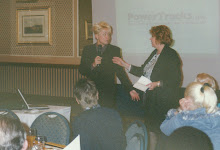We’ve all heard the cliché, competition is fierce. When it comes to this job market, it may feel as though this really is true. But is it really that competitive out there or are you not stepping up to you’re A-game when going after what you want?
Try this cliché on for size: Cream always rises to the top.
I can’t tell you the number of cover letters and resumes I’ve received over the years that did nothing to compel me to read beyond their “objective”. Quite frankly, I already knew their objective was to get a job when they sent me the resume in the first place so reiterating this at the start is just a time waster. Beyond this, it was the tedious and painful reliving of every copy they ever made, phone call they ever placed, or report they ever wrote (three to five times over when working at multiple companies) that had me toss their resume aside in favor of a resume that would tell me what its author could do for my organization. Sometimes I was successful in my search and other times, not.
Competition will always exist – in good times as well as bad. That’s not the issue. The problem is that too many people believe that what worked for them when companies needed to hire warm bodies is the same thing that will work when real competition exists. A Google search of the term “resumes” produced more 5 million sites. It is not that information on how to write a resume is scarce; it’s that, for the most part, many job hunters simply don’t want to do what it takes to rise above the crowd. In plain English, their resumes stink. They are poorly planned and executed. Their cover letters, if they bother to write one at all, is littered with irrelevant verbiage. It tells the hiring company nothing about why they are the best person for the job. When you commit these job hunting sins, do you really have the right to complain about the employment situation?
The underlying issue is that some people just don’t want to do the work it takes to get what they want because it is hard. Spending several hours, days, weeks, and months writing, editing, and rewriting a resume for a specific job is tiresome; so it is with cover letters. But the people who invest – yes, ‘invest’ – the time it takes to write a moving resume and cover letters are often the ones who receive the call back for an interview. Not so coincidentally, they are also the ones who receive the job offers – even in bad times.
Can’t string together a sentence? Then get professional help. Just as you might not change out a carburetor on your car without the requisite knowledge, if you don’t know what you’re doing with your resume, hire someone who does. Forgo the movies, dinner out, or whatever it takes to hire the people necessary to whip that document into shape.
And, while we’re at it, take a course to brush up on skills that are non-existent or may be rusty. I believe it is de rigueur these days for hiring companies to ask that candidates have computer skills. You may think you are beyond this, what with your plethora of other skills and experience, but if they want Excel experience, give them Excel experience. Take a class.
I have seen some downright bad resumes in my time. I often wondered if the candidate would have had a better chance at getting an interview if just sending their name and phone number. A poorly written resume told me about their lack of attention to detail, that they were unable to effectively communicate, and, most importantly, they didn’t care enough about the opportunity to go the extra mile to get it. They would almost certainly bring that same attitude to the workplace.
This is not a job hunt tactic but a life philosophy. Do what you do better and more consistently than anyone else and you will find success.
Executive Onboarding Note: The Importance Of The Confidence To Be Open To
Help
-
While executive onboarding, get help. If it’s offered, take it. If it’s not
offered, find it.
The post Executive Onboarding Note: The Importance Of The C...
7 years ago




No comments:
Post a Comment